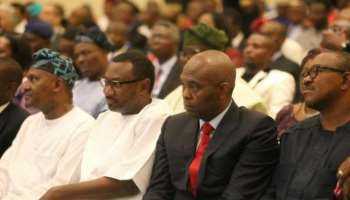FSR: Creating more jobs in the entertainment industry
The entertainment industry in Nigeria is a vibrant and very vital sector of the economy. It is the second highest employer of labour in the country, aside the civil service. The practitioners are mostly young and creative individuals.
The industry comprises mainly the music and movie aspects but also includes the hospitality industries like hotels, recreational centres as well as events management companies. This is because they play host to the two major groups.
Long before political independence, Nigerian entertainers had made inroads into other parts of Africa, especially in the musical genres of highlife and jazz.
The coming of television production in Nigeria in the late 50s saw the emergence of a crop of highly-talented actors and actresses for drama presentations on television, stage and radio. Musicians also began making appearances on television.
However, musicians were more recognised as of the time because of the wide reach of their works. Music gets air play on far flung radio stations and in dance halls and parties in different cities within and outside Nigeria.
Drama presentations on the other hand were more restricted and drew fewer audiences. Committed actors had to rely mostly on stage productions put together by various states' departments of arts and culture and a few appearances on television. It was, therefore, not a business or industry that offered full employment with guaranteed attractive salary even though practitioners like the late Hubert Ogunde, and Duro Ladipo, left their marks in the field.
The advent of home entertainment and the influx of foreign music and films dealt a serious blow to local entertainers and their industry as people were inevitably drawn to watch and listen to foreign music and films. The local industry and its practitioners suffered serious setback since there was no lifeline from anywhere. The future looked bleak for the two dominant arms of the entertainment industry; music and movies.
Reprieve/renaissance came for the film/television practitioners in 1992 when a local entrepreneur, Kenneth Nnebue produced and released the video film “Living In Bondage” to very wide national acclaim. The success of the film saw the beginning of massive production of local video films with completely indigenous content and with local artistes who went ahead to become big stars in the industry. From then on, many entrepreneurs began funding video film productions due to huge profits it generated and studios began to emerge for post production work on these films.
The boom in video film production and sales was not restricted to Nigeria as Nigerian films found their way into other African countries, Europe, America as well as other parts of the world.
These achievements do not however mean that all is well with the Nigerian entertainment industry. The global economic meltdown adversely affected the industry since it had always been almost exclusively funded and sustained by private businessmen whose only interest is profit.
The huge blow, which piracy has dealt the entertainment industry can be gleaned in the few number of poorly produced films and music which are released nowadays. Many movies and music production companies have since folded up. Many more marketers and distributors of creative works have abandoned the trade to face other lines of businesses. Economic hardship compounded by the removal of fuel subsidy and insecurity in the country has also added to the woes of the industry as there is little patronage for films and music these days. People's meagre resources are channelled towards basic needs like food, clothes and shelter.
For the first time in the history of Nigeria, a serving president took note of the plight of the industry and intervened positively. President Goodluck Jonathan made available the sum of two hundred million dollars ($200,000,000)as intervention/bailout fund for the entertainment industry. This is a welcome development and ought to be applauded by all as a step in the right direction.
To create more jobs in the entertainment industry in Nigeria in line with the transformation agenda of the present administration, government as a matter of urgency, should look into the following areas and intervene as quickly as possible:
PIRACY: There is urgent need for government and its relevant agencies to tackle piracy in all its ramifications.With the total elimination or serious reduction in piracy, many music and film production companies will bounce back into reckoning.
LAWS TO STRENGTHEN THE REGULATORY BODIES: Government should enact laws to strengthen the industry regulatory agencies. This will enable these agencies to perform their duties with optimal result.
FUNDING: Funding is very critical to the survival of the entertainment industry and creation of more jobs for its practitioners. Although the federal government under President Jonathan made available the sum of $200,000,000 for the bailout of the entertainment industry, there is a need to identify other alternative sources of funding for the industry.
For instance banks, corporate bodies, multinationals, construction companies, the oil and gas sector/oil prospecting companies should be mandated by government to set aside a specific percentage of their earnings for the entertainment industry. They will in turn be given tax incentives by government.
DISTRIBUTION AND MARKETING: At the moment, independent marketers and distributors have outlets in some (not all) major cities in the country. The scope of their distribution network is highly limited.
To make marketing and distribution of entertainment works more effective and easily available to people in all nooks and crannies of the country, government through relevant agencies should encourage the use of facilities like the National Theatre, Lagos, all states councils for arts and culture, all local government headquarters, hotels with large capacity halls, as well as all petrol stations and supermarkets across the country, to serve as both viewing centres and distribution outlets.
TRAINING: There is need for constant training in all aspects of the entertainment industry, in order to create more jobs as well as meet the demands of the sector locally and internationally.
ATTRACTING FOREIGN INVOLVEMENT AND INVESTMENT: For the Nigerian entertainment industry to be properly aligned with the global entertainment market and generate jobs locally, there is need to attract foreign involvement and investment in the local industry. The potentials in the entertainment industry in Nigeria are limitless and their value for national development and integration is immense if properly harnessed.
Bob-manuel Udokwu, Producer and Director wrote in from Lagos.
Latest News
-
 "If You're For Me, I Am For You" - Cubana Chief P
"If You're For Me, I Am For You" - Cubana Chief P -
 "3 Days To Go" - Femi Adebayo Urges Fans To Get S
"3 Days To Go" - Femi Adebayo Urges Fans To Get S -
 "Stop Asking Me Questions About Speed Darlington"
"Stop Asking Me Questions About Speed Darlington" -
 "Benue Is The Most Underdeveloped State I've Ever
"Benue Is The Most Underdeveloped State I've Ever -
 Stan Alieke Urges Young Professionals To Take Lin
Stan Alieke Urges Young Professionals To Take Lin -
 Chizzy Alichi Teases Fans With Baby Reveal, Promot
Chizzy Alichi Teases Fans With Baby Reveal, Promot -
 "I'm Not Wearing Makeup From July 4th Till Decemb
"I'm Not Wearing Makeup From July 4th Till Decemb -
 "Stop The Challenge Of Mocking Kids With Down Syn
"Stop The Challenge Of Mocking Kids With Down Syn -
 Regina Daniels Celebrates Sons As They Mark Birthd
Regina Daniels Celebrates Sons As They Mark Birthd -
 Speed Darlington Threatens To Sue NAPTIP For Defam
Speed Darlington Threatens To Sue NAPTIP For Defam














